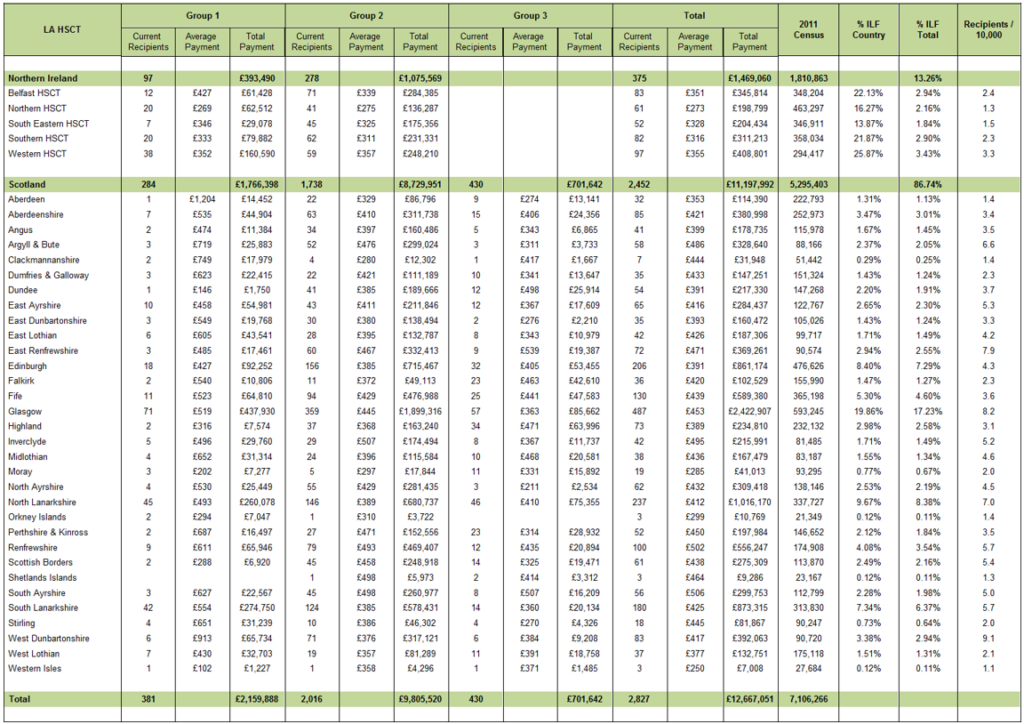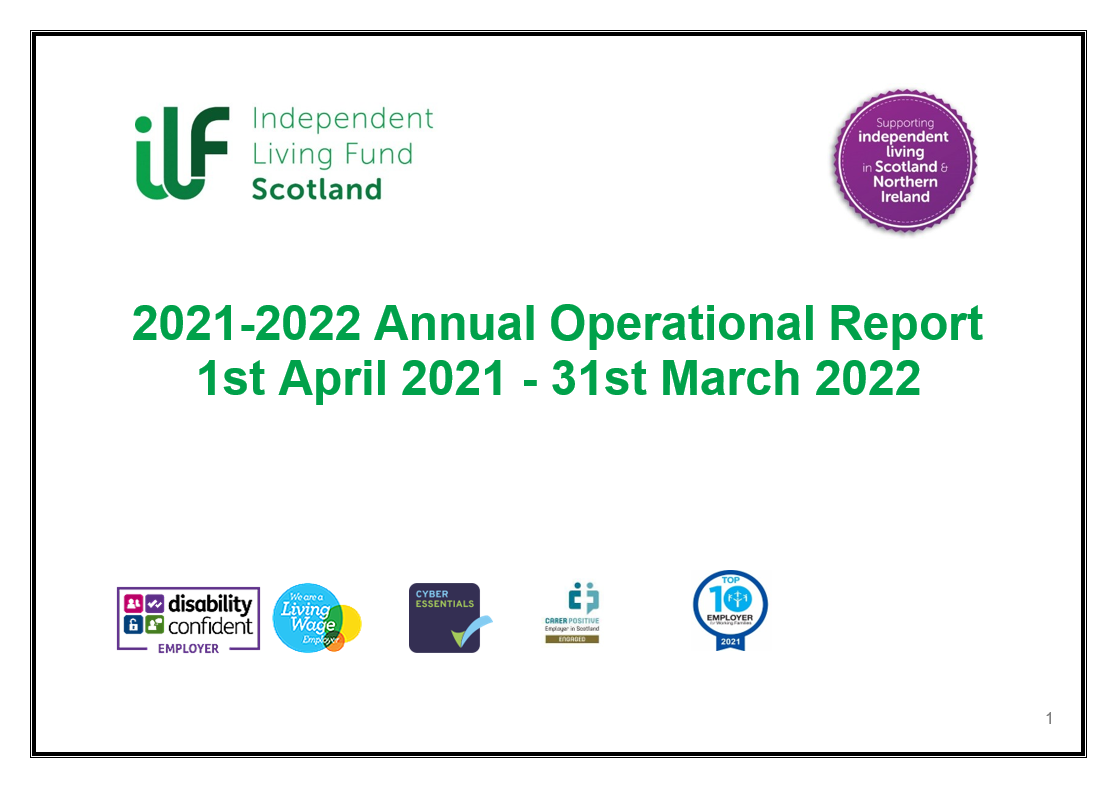
| 1. Introduction | 3 |
| 2. Progress Update | 3 |
| 3. Self-Directed Support Summary | 25 |
| 4. Policy, Improvements and Engagement Summary | 26 |
| 5. People Summary | 28 |
| 6. Information Governance and IT Summary | 32 |
| 7. Finance Summary | 35 |
| Annex A – Operational Dashboards | 37 |
The purpose of this report is to provide an annual summary of achievements and activities against the business plan during 2021-22.
a. Executive Summary – As we move slowly out the pandemic, the last 12 months have seen the busiest operational period since we first went live in 2015. This in part has been due to the impact of Covid-19, but also due to the continuing success of the Transition Fund, coupled with day to day operations alongside the delivery of our strategic plan. We have continued to work hard in being supportive, innovative and flexible in our response to the pandemic as we slowly edge to a new normal. However, what is clear from our work with disabled people, is the impact of Covid-19 will take many years to unravel.
Overall there has been significant progress towards the 3 strategic priorities in our business plan and the sense of high level support for re- opening the 2015 Fund in both Scotland and Northern Ireland. Of key note alongside the business plan, ILF Scotland also successfully delivered in collaboration with Scotland Excel and Self Directed Support Scotland (SDSS), the Scottish Government's thank you payment scheme to Personal Assistants (PAs). This was an exceptionally complicated piece of work, which mainly took place in Q2 and Q3. Due to this success, ILF Scotland was approached by the Northern Ireland Government to provide a similar scheme which has been developed and will be delivered in Q1 and Q2 2022/23.
From an operational perspective, we have stayed fully open throughout the financial year, supporting over 6,200 disabled people (this number includes closed cases) across Scotland and Northern Ireland to have choice, control and dignity, which is an increase of 24% from last year. We have dealt with over 18,000 contacts via phone, text and email compared with just over 11,000 the year before and this increase is mainly due to growth in the number of individuals supported alongside the complexity of issues. It has also been a record year for the Transition Fund with 2,275 applications received, a 25% increase from the year before.
Over the year 2015 Fund recipient numbers have dropped to 2,435 ( Scotland 2,056 & NI 379) from 2,572 (Scotland 2,160 & NI 412). This represents a slight increase in the overall decline trend from around 4.4% (4.2% Scotland & 5.5% NI) in 2020/21 to 5.4% (4.8% Scotland & 8% NI) in 2021/22. Correspondingly the total number of individuals supported through the Transition Fund has increased by 47.2% from 2,575 to 3,790 by the year end.
Worryingly, disabled people are experiencing even more difficult times as we come out of pandemic protections, which further deepens societal inequalities already in place. Though the cost of living has only become acute in the last part of the financial period, for disabled people this has made scarce resources even harder to stretch. When this is added to the ongoing challenges of living with Covid-19, and the social care staffing predicament, the situation for disabled people is arguably as bleak as it has been for decades.
This is being starkly highlighted as we have returned to physical reviews for the 2015 Fund throughout the year. We are seeing much more complexity in these as a result for the aforementioned reasons, which is further exacerbated by the slow rebuilding of statutory services in the community. To that end, our reviews are taking considerably longer to complete, with our clear priority to ensure disabled people are able to live with choice, control and dignity. This has further strengthened the case for the reopening of the 2015 Fund in both Scotland and Northern Ireland where forward momentum has continued throughout the reporting period. By the year end, there are submissions sitting with Ministers in both Northern Ireland and Scotland for their consideration and we look forward to working alongside key stakeholders to make this a reality for disabled people. .
To support the increasing year on year work pressures on staff, we have carried on renewing and refreshing our employee offer. This has included the introduction of new measures and initiatives, expanded later in the report, to help our staff get through the year whilst enabling them to bring their best to the workplace. We are very proud to have again been awarded a Top 10 Employer in the annual Working Families benchmark in September 2021, especially in the context of our busiest year ever. But, we are even more proud of the continued excellence, passion, hard work and professionalism of colleagues who have performed brilliantly throughout 2021-22!
In summary, as can been seen from the brief narrative set out above, it has been another extraordinary year for ILF Scotland dealing with the profound impact of Covid-19 on us all alongside the ever more acute cost of living. We have had the busiest, yet in some ways the most rewarding reporting period by any benchmark since opening in July 2015. We continue to work towards re-establishing normal operations, implementing our new strategy, extending the Transition Fund, re-opening the 2015 Fund to new applications in Scotland and Northern Ireland (subject to Ministerial approval), supporting the Scottish Government to deliver the recommendations in the Independent Review of Adult Social Care and enabling even more disabled people to live independently.
b. Business Plan Progress – Looking back over the year, overall there has been strong progress towards the 3 strategic priorities. Of key note alongside the business plan, ILF Scotland also successfully delivered in collaboration with Scotland Excel and Self Directed Support Scotland (SDSS), the Scottish Government's thank you payment scheme to nearly 5,000 Personal Assistants (PAs). This was an exceptionally complicated piece of work, which mainly took place in Q2 and Q3. Due to this success of this,, ILF Scotland was approached by the Northern Ireland Government to provide a similar scheme. Over Q3 and Q4, ILF Scotland worked extensively with the officials in the Northern Ireland Government to finalise the delivery of the Special Recognition Payment (SRP) service, which opened for business at the end of the financial year. Besides some technical differences with the Scottish scheme, ILF Scotland is not only providing the payments mechanism, but also the majority of the helpline capacity alongside partners in SDSS. Though this has undoubtedly put additional pressure on an already stretched organisation, it was considered the right thing to do getting payments to PAs, as no other organisation in Northern Ireland or Scotland had a workable solution, besides ourselves and two partners,
Alongside the payments service, as mentioned above, normal business has continued and in year progress towards the strategic objectives is on track. Two key areas worth highlighting are the full review of the policy suite to ensure they remain fit for purpose, and the progression of our Equalities Mainstreaming, Corporate Parenting and Charter for Involvement Action Plans. These have been key pieces of work and we are delighted have progressed these in year.
Internally, ILF Scotland remains under significant pressures and despite media reports that the COVID crisis is now over, infection and hospitalisation rates remain high, which places health concerns on our own workforce and ability to operate back out in the community. We have made a strong start in the very lengthy and complex unravelling of recipient award packages as a result of the pandemic. This has resulted detailed negotiations around packages and this is putting additional time pressures on both Assessors and Caseworkers to then implement the new changes. In tandem with this, we have seen considerable growth in the applications coming into the Transition Fund with a record year for the 4th year in a row.
Looking to the future and fulfilling the current strategy, significant progress has been made on the digital transformation business case and organisational sustainability. Both areas look to achieve greater efficiency through smarter use of technology, of staff, of resources and operational processes to reduce our consumption and work towards at Net Zero position by 2045. Key work has been completed to create an operational framework for taking all this forward during the final year of this strategy and is on track to deliver our Net Zero Action Plan by the end of this current strategy.
Overall the business plan is on track to deliver the strategic priorities by the end of this current strategic cycle and is optimistic about its key priority of re-opening the 2015 Fund during it.
Strategic Outcome 1 – Facilitate the independent living needs of disabled people:
Strategic Objective 1 – Development of the evidence base and proposals to re-open the 2015 Fund

Strategic Objective 2 - Developing the relationships and protocols to be part of an integrated national model of Health and Social Care delivery
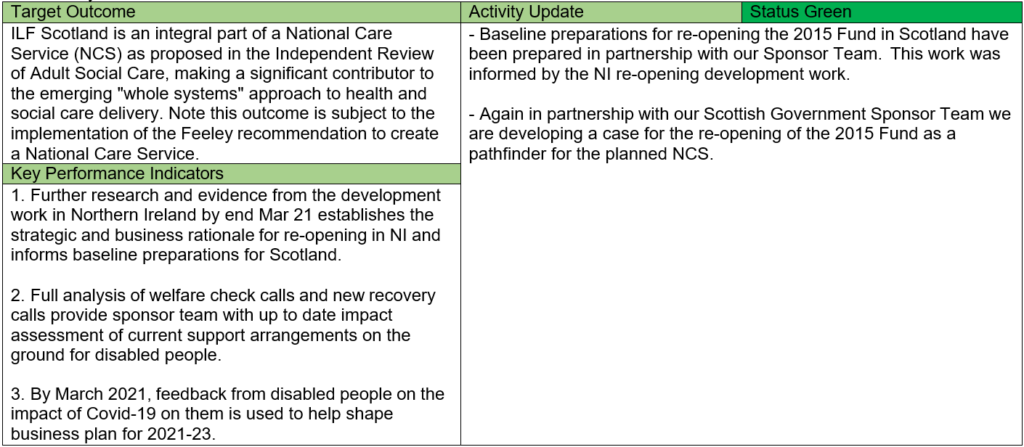
Strategic Objective 3 – Develop the Transition Fund

Strategic Objective 4 - Increase awareness levels of our Funds and the numbers of people it can support


Strategic Objective 5 - Review and update our policies and practices to reflect current and emerging national HSC delivery plans
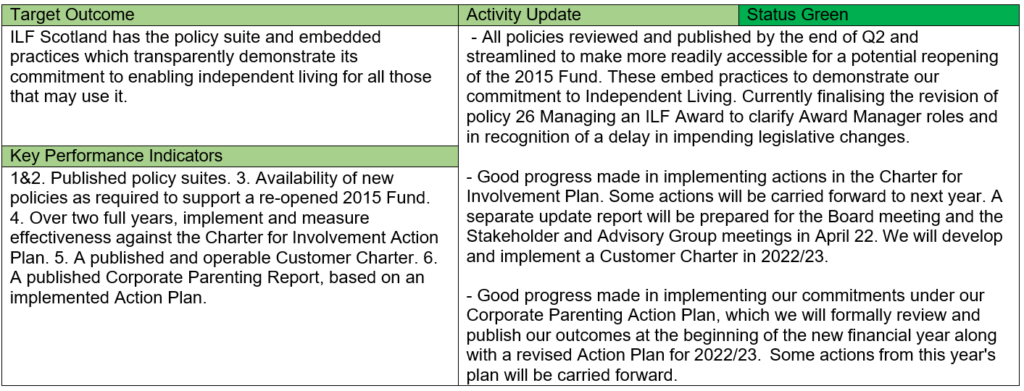
Strategic Outcome 2 – Be leaders in enabling independent living:
Strategic Objective 6 - Be leaders and champions in sharing our knowledge of enabling independent living with others

Strategic Objective 7 - Develop and shared understanding and best practice model of enabling sustainable independent living outcomes


Strategic Objective 8 - Linking our data and reporting to the National Performance Framework (NPF)
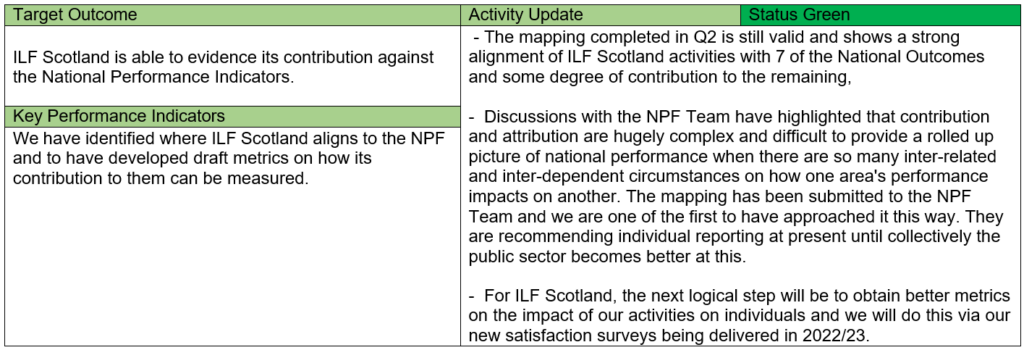
Strategic Objective 9 - Share our knowledge and work with people with lived experience of disability to help improve the delivery of social care and support services

Strategic Objective 10 - Design new services with disabled people at the heart of them

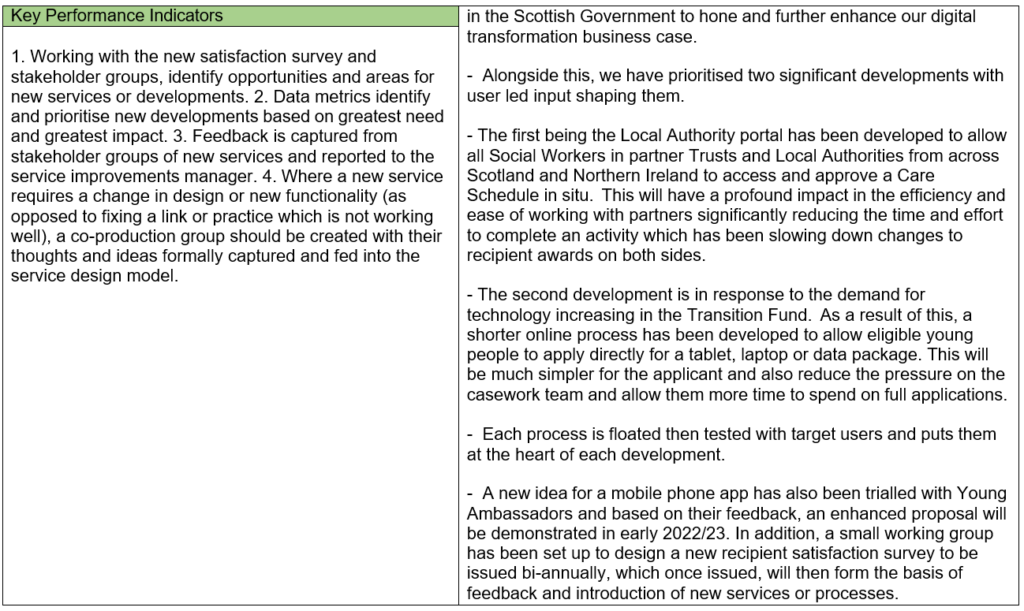
Strategic Outcome 3 – Operate a high-quality efficient service:
Strategic Objective 11 Re-establish recipient reviews as soon as possible
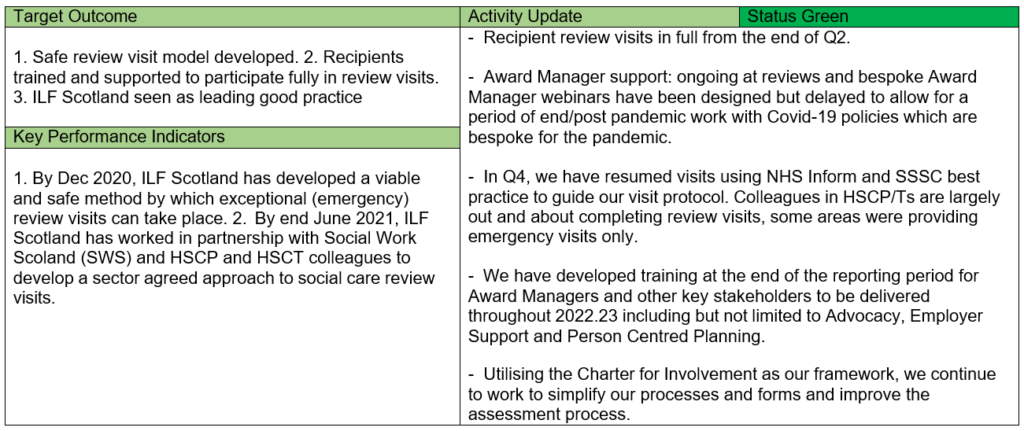
Strategic Objective 12 - Prepare the full business case for a fully integrated, digitised, ILF Scotland as part of the wider whole systems approach to health and social care delivery

Strategic Objective 13 - Develop and implement the workforce operational model to support a re-opened ILF Scotland
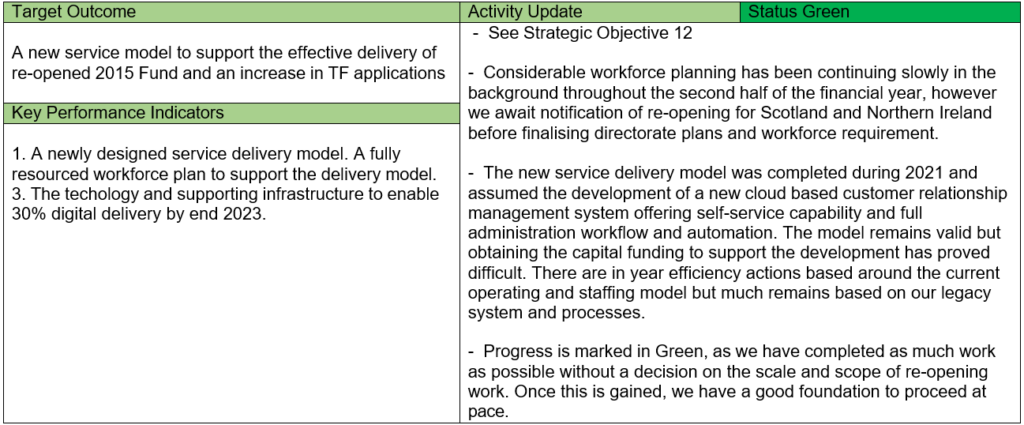
Strategic Objective 14 - Progress organisational risk and resilience programme


Strategic Objective 15 - Be a Top Employer for our staff

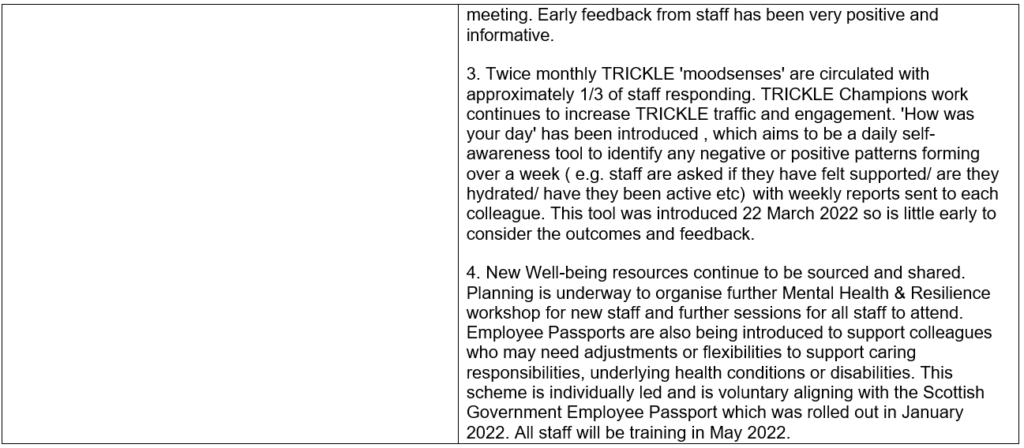
Strategic Objective 16 - Reducing our carbon footprint and introducing our sustainability model

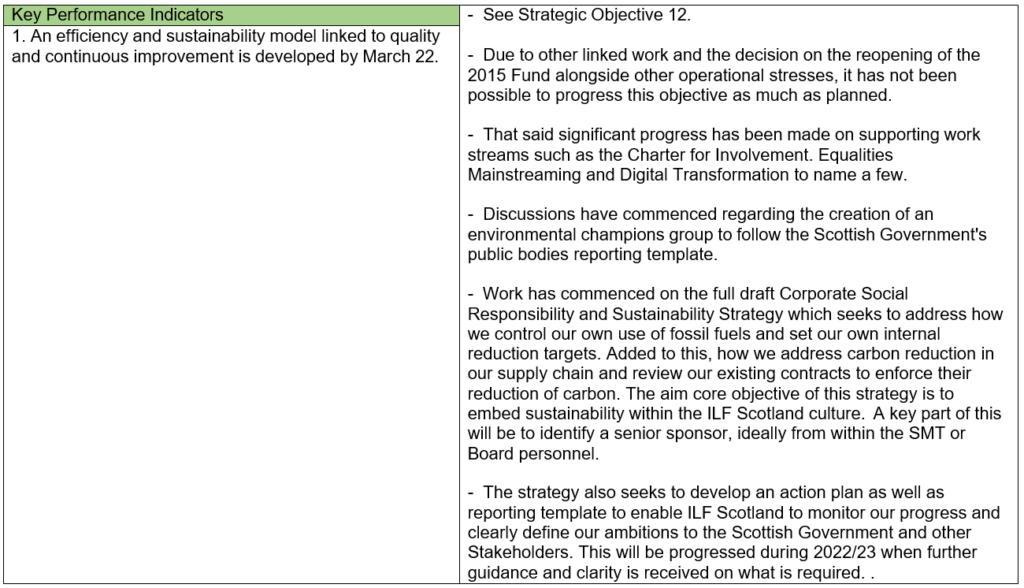
Strategic Objective 17 - Develop and enhance communication channels with recipients to reduce reliance on paper based channels
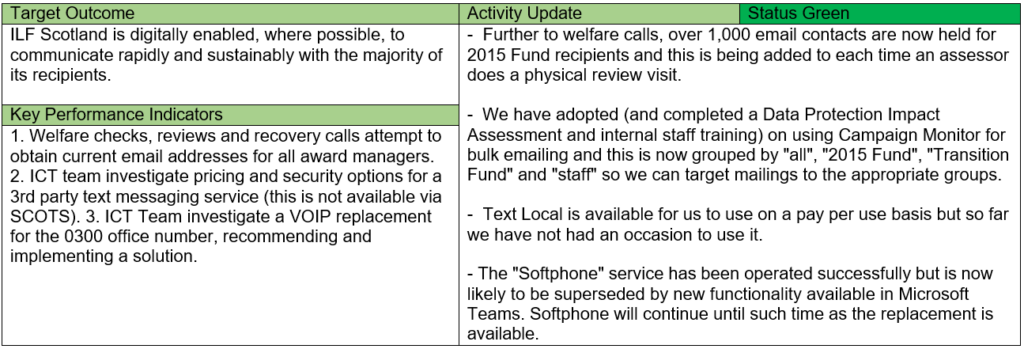
Strategic Objective 18 - Audit and compliance reporting cycle to continue


Strategic Objective 19 - Develop and implement a new reporting model to evidence satisfaction with the delivery of our service

Strategic Objective 20 - Improve the efficiency and ease of financial reporting for the organisation

Strategic Objective 21 - Ensure the financial viability of ILF Scotland
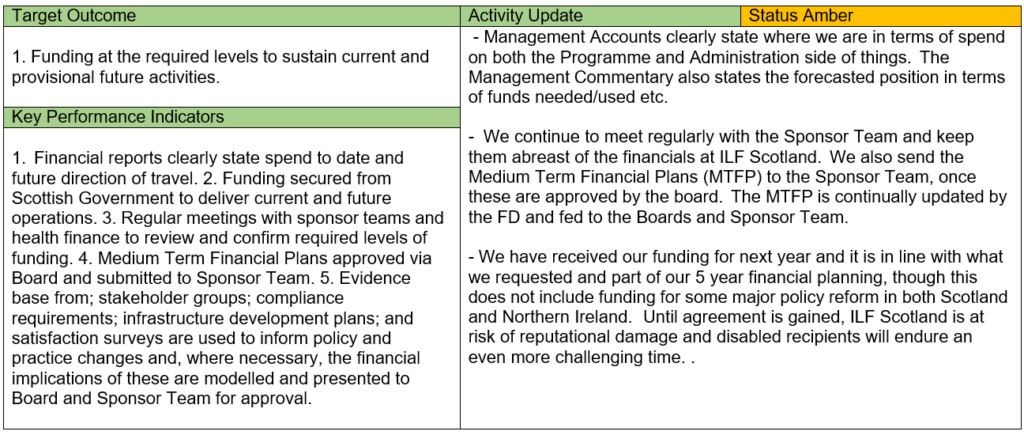
Strategic Objective 22 - Complete and implement the Equalities Duty Action Plan and Gaelic Language Act responsibilities

Strategic Objective 23 - Complete and implement Equalities Mainstreaming Action Plan
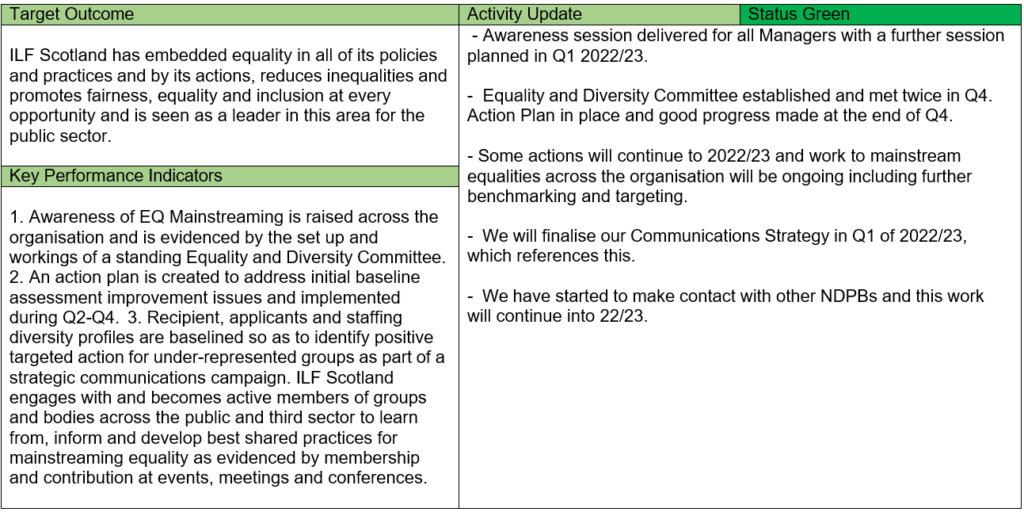
a. Social Work Update (2015 Fund) - Over the reporting period we have moved back to physical reviews though due to the infection rates, we have had to constantly adjust our operational posture, To enable reviews to come to a completion, we have temporarily waived a number of
key policies and procedures around Local Authority engagement and service input because Local Authorities advise they can currently only deal with emergency assessments in many areas. Initially we hoped to return to the ordinary balance in awards by the end of March 2022, however the continuation of Covid-19 Policy flexibilities until 30th June 2022 makes that a better fit. This also fits with early intelligence from contact with Health and Social Care Partnerships/Trusts that the lifting of restrictions has coincided with increased staff absence. It is expected when this peak is passed, a widespread re-opening of services is anticipated in the next financial year.
During the past year we had approx. 18,000 calls to operations teams which is an increase of 30% from the previous year. This clearly evidences that our role during the pandemic deepened and widened to provide a range of supports.
However, an ongoing part care management type role whilst vital to recipients during the pandemic is unsustainable. In 2019/20 we completed 1,900 review visits, a typical year. In 2020/21 during the height of the pandemic, we completed 172 visits, Though it should be noted we carried out over 5,000 in depth welfare calls during this period instead. Through 2021/22 when pandemic restrictions were largely in place we completed 400 review visits. We need to renew and clarify our role for the next year to stakeholders if we wish to get back to the necessary rate of visits to offer a visit every 2 years. This is despite a reduction in overall recipients in the fund of 5.5% this year to 2,432 2015 Fund recipients. Analysis of the reviews illustrates some key changes from previous review cycles:
This year we continued to engage with N Ireland Trust Leads and Scottish HSCP Leads. In Scotland this has also meant working closely with Social Work Scotland on various SDS projects and joining the new SDS National Collaboration and a new cross party group on Social Work hosted by the Scottish government.
b. Summary – The operational environment remains challenging for staff supporting very stretched and stressed carers (Who very much welcome a visit) and anxious and isolated young people to apply to the Transition Fund. Many ordinary policies and procedures are suspended for good reason yet it adds layers of complexity to decision making and delays in processing reviews. We intent to assert our role and policies in the next financial year to bring better inputs from HSCP/Ts and complete review visits at a rate that sees a return to the 2 year cycle with the important benefits that a visit brings to recipients.
a. Policy and Improvement – We comprehensively reviewed all of our 2015 and TF policies in 21/22. Carrying out a further review currently of Policy 26 Managing an ILF Award.
b. Covid-19 Flexibility – Covid-19 policy flexibility continued throughout the year with both the Scottish and Northern Ireland Government's extending this to the end of June 22. We continue to pay additional sums for replacement awards to a small number of recipients.
c. Reporting – Alongside this we have made good progress in implementing actions in our published Equalities Mainstreaming and Outcomes and Corporate Parenting reports Charter for Involvement Standards. We will provide summary reports to the Board and the Stakeholder and Advisory groups in April 22.
d. Transition Fund (TF) – By the end of Q4 we received 2,275 TF applications, an increase of 24.5% on last year. Application numbers have fluctuated throughout the year, linked in part to service and activity restrictions because of Covid-19, although we have seen a significant upturn in Q4 when compared with Q2 and Q3 and we received 642 applications in total, a new record for a single quarter. Challenges around processing applications remain high due to the poor quality of submissions and the lack of necessary supporting documentation but staff are working hard to reduce the backlog. An additional 2.6 FTE was added to the TF team in Q3/4 and the benefit of this is already being felt. Focus on ongoing improvement and efficiency efforts remains.
e. Communications and Engagement – The Communications team delivered external communication (direct and digital) to all our stakeholders on the following::
The build and development of the new website is on track and we remain on schedule for the planned June 22 launch date. This improvement will make a significant difference in how our key external stakeholders are able to access and engage with vital information on our website.
In celebration of International Women's Day, we launched a fantastic blog from one of our Scottish Recipient Advisory Group members and recipients, Nic Reid, on why more disabled women are needed in leadership positions.
In conjunction with this, we completed extensive online events throughout the year with a number of in person events in Q4 (19 with around 235 attendees). We also focused this engagement working with key stakeholders and partners in areas where the organisation is receiving the least applications to the Transition Fund – Moray, Western Isles and Orkney. This will continue into Q1 and Q2 of 2022/23 in line with the aims of our Corporate Parenting Plan and Equalities Mainstreaming Action Plan.
To also compliment this and to encompass an all-round strategic communications approach, we also delivered a successful paid social media and PR campaign, which achieved a combined total reach of 97,172.
f. Complaints – For the full 21/22 year we received 34 complaints compared to 14 in 20/21. The majority of these complaints related to the Transition Fund. Complaints in 2020-21 saw a significant drop compared to the previous year. We think this was because people were pre- occupied dealing with the pandemic. In 2021-22, complaints picked up again and were similar in number to that of 2019/20. We received 9 complaints about the 2015 Fund and 25 about the Transition Fund, 5 of which were from the same person. We capture each learning point from this valuable feedback about our service and act to address any issues raised through revised procedures, staff training, etc. in the spirit of continuous organisational improvement.
a. Overview - 2021-22 has again been a most challenging and extremely busy year since ILF Scotland was created in 2015. Alongside additional projects, COVID-19 and volume of work we have seen increasing year on year work pressures. We have continued to offer innovative support to our workforce, introducing new measures and initiatives to help our staff get through the year. This year has again seen a comparatively low attrition rate with one original staff member retiring and 2 others leaving to promoted posts. Our absence rate, understandably has increased this year as we work out way through the pandemic predominantly with several long term absences. We are very proud to have again been awarded a Top 10 Employer in the annual Working Families benchmark in September.
We have, as always tried to remain an optimistic, open and supportive employer. The Health and Wellbeing programme has remained front and centre of our decision making as we made our way through the year offering several workshops including ‘Reconnecting and dealing with anxiety as we exit Covid-19’. We continued through the year to meet all staff monthly through ZOOM and this will continue into 2022-23 as we emerge from the pandemic. ‘Keeping in Touch’ with smaller staff groups remains important to reconnect. Our Trickle App has been used twice monthly to gauge staff mood through our ‘mood-sense pulse surveys’, reacting appropriately to comments and feedback. The Trickle App has built momentum over the last year and is now embedded as a great tool to connect, discuss with staff enabled to openly discuss issues wither anonymously or recognised.
As with Q1-3, Q4 has continued with continuing pressures on staff as a result of new projects, increased workload and Covid-19. Staff have recently found it challenging to remain upbeat despite the pandemic restrictions improving. We remain vigilant and not complacent that the impact continues to challenge us all. Current planning is underway to continue further Mental Health & Resilience workshops from the Strong Minded Resilience Team and promote our own Mental Health First Aiders to all staff. The NHS Wellbeing Hub has been heavily promoted throughout the year and feedback has been positive. Our staff also accessed 8 health & wellbeing workshops offered by Scottish Government which was well attended over the months between December 2021 to February 2022.
During this year we supported another student Social Worker from Stirling University who completed her placement at the end of November 2021. We look forward to welcoming more students through 2022-23.
During Q4, planning started to introduce an’ Employee Passport’ which is a voluntary scheme to encourage all staff to discuss adjustments they may require for underlying health conditions, disabilities, caring responsibilities and personal needs with their line manager – recording it only once. This passport can be taken from team to team or across Scottish Government and other public bodies who have introduced the scheme. This passport ensure employees only have to share their individual needs and adjustments once as it is recorded in the passport.
The passport is led by the employee and should be reviewed regularly.
b. Organisational Demography – Organisational Demography – By the end of Q4 2021-22 the organisational make up remains at 73: staff (66) and Directors (7): 74%:26% female.
c. Employment status – During 2021-22 we have continued to be a supportive work friendly employer offering a suite of life friendly policies. We have listened and reacted to feedback from colleagues through our Staff Survey and TRICKLE which has informed positive change.
ILF Scotland offers different contractual opportunities to all individuals employed in some capacity within the organisation. Currently 66 staff have employed status, with one colleague on a freelance contract. This continues to provide stability and continuity for both the organisation and individuals at this time of uncertainty. During 2021-22 all staff have worked 100% flexibly and we will continue to ensure staff can have a work/life harmony which suits their individual circumstances. Our social work student started in September 2021 and reported a positive experience. The student has been supported well by 2 of our experienced Assessors. Detailed planning work is underway looking at our Workforce Plan considering new duties ILF Scotland may be formally requested to discharge in due course.
d. Recruitment – In Q4, due to increasing workloads across the organisation and in part due to the Covid-19, unintended consequences of changing policies, staff leaving and wellbeing calls, we have continued to build and strengthen our workforce. During Q4 2021-22 the following roles have been appointed:
Q1:
Q2:
Q3:
Q4:
e. Retention – During 2021-22 staff retention remains high with 3 staff leaving in the financial year:
f. Absence
| Sickness Absence | 2021-22 | 2020-21 |
| Long Term | 2.74% | 3.01% |
| Short Term | 2.28% | 2.01% |
| COVID-19 Sickness (included in Short term) | 0.47% | 0.11% |
| Total | 5.02% | 5.02% |
Sickness Absence : Q4: 01 January 2022 - 31 March 2022
Absences have continued to be higher than previous years mainly due to long term illness and Covid-19.
We do believe we are now seeing the consequences of continued high tempo of work coupled with the isolating impact of Covid-19, with colleagues reporting exhaustion and increased anxiety. Indeed we strongly believe our absence rates would have been much higher had we not taken such positive action in the area of wellbeing and supporting colleagues through this unprecedented time. Some staff have been working with our Occupational Health partners and we hope to see a reduction in our sickness absences as we move into 2022-23. We continue to offer mental health support through our 4 Mental Health First Aiders. The Mental Health First Aiders have met quarterly to discuss any concerns and how to promote the organisations Mental Health First Aid work.
g. Disciplinary, Grievance and Performance – Nil to report.
h. Staff Survey – The 2021 staff survey took place for 6 weeks during April and May. Data analysis from the staff survey evidenced a workforce which remained positive and upbeat. Staff acknowledged positively the supportive offerings from ILF Scotland at the start of the pandemic. The report was presented to the Remuneration Committee in September 2021. Overall the survey was very positive despite the 15 month period prior to the survey. A working group reviewed the report and introduced the following – introducing team presentations at the monthly All Staff Meetings to understand how we all work towards the same purpose and the ‘Get to Know Your Board Directors’ presentations which started in December 2021 All Staff Meeting. They will continue every 2 months for the next year. Staff Survey 2022 will be circulated again during April 2022.
i. Supporting Activity – to enable the organisation to successfully deliver the strategy and be an employer of choice, and as a small sample, the following activity has taken place:
a. Records Management - throughout the reporting period has seen significant progress towards the implementation of the new corporate file plan and G Drive reconfiguration. The future state move for ILF Scotland is to be away from the Scottish Government IT infrastructure and to have its own instance of a single data repository for its own records. The first step in this is having a fully cleansed and properly structured records management system which at a future state can be "lifted and shifted" into any new cloud based operating platform. There have been some capacity issues with Scottish Government not being able to support us through this so additional resource was approved by SMT to use Leidos (who are the main SG contractors). Work progresses well and once our permissions levels are set, all staff will be able to migrate their records into the new structure with the completion date planned in early 2022/23.
b. Digital and System Developments – The in year developments have progressed well and are in final testing stage ready for a go live during Q1 of 2022/23. We have slowed the work down to allow for the implementation of the second Social Care Living Wage uplift and the Special Recognition Payments project in Northern Ireland, alongside the end of year activities of the Transition Fund and Communications Team. So far the demonstrations of the Local Authority portal and the Technology Grants have been well received and once year end activities are over, these will be the priority projects. Still in the digital space, much additional work was completed on the business case for transformation funding and has been submitted to colleagues in the sponsor team and health finance for review and consideration. This piece of work, whilst having a strong technical driver, sits in the context of re-opening ILF Scotland and what the new operational model might look like and the staffing structure to deliver its services. Whereas the current efficiencies reported equate to the saving of 1 FTE annually, the digital transformation project has the ability to automate or digitise 50% of the current line of business activities and so represents a significant potential change to how ILF Scotland operates in the future.
c. Risk and Resilience – Finally this period, the work on the resilience project has almost reached the end of Phase 1 which is the creation of the individual resilience solutions for the different work areas. An initial disaster scenario walk through exercise was completed to "test" these new solutions and once refined, will be taken forward to run a full desktop exercise for senior managers early in the new financial year. This will also be the time period in which the Resilience Hub will become operational and will bring together all critical processes, resilience solutions, crisis communications and crisis response teams. The team has been incredibly busy and alongside all the change activity, have kept us safe from cyber-attacks and protected our data.
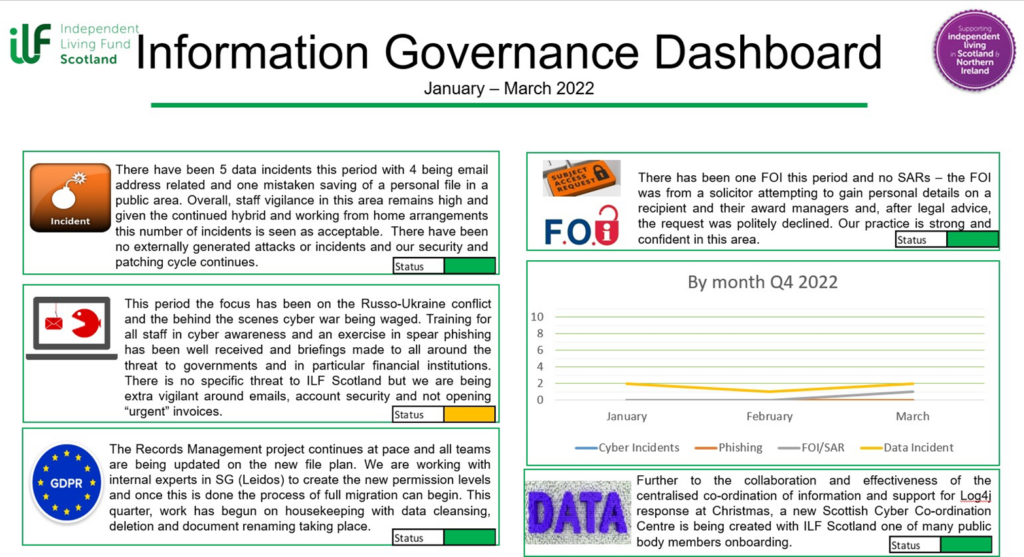
a. All financial reporting happens via the Audit and Risk Committee and Management Accounts, however the some additional points for Finance are as follows:
As part of the corporate reporting project, the following dashboards show our performance in both the 2015 and Transition Funds:
(NOTE – ALL THESE WILL BE UPDATED WITH THE END OF QTR. FIGURES AND ARE INCLUDED FOR INDICATIVE PURPOSES AT PRESENT)
a. The dashboard below provides an overview for both Scotland and Northern Ireland in relation to the 2015 Fund:
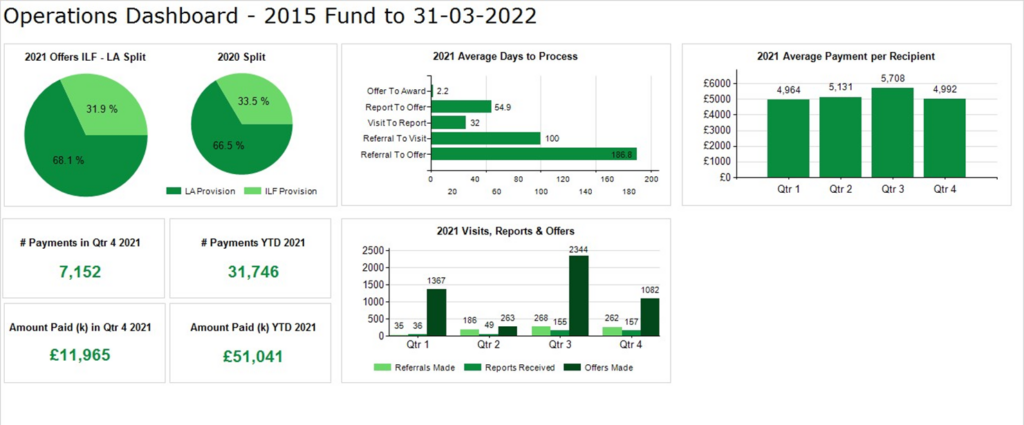
b. The following dashboard provides an overview of operational activity in relation to the 2015 Fund specific to Scotland:
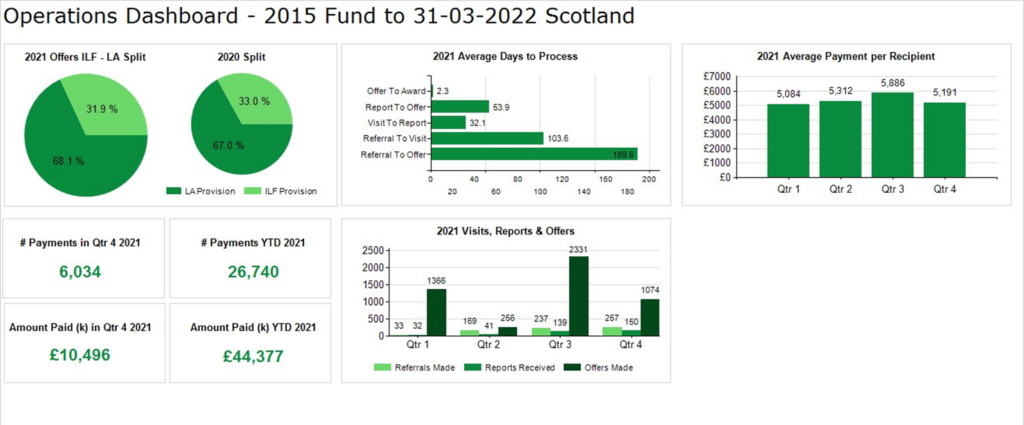
c. The following dashboard provides an overview of operational activity in relation to the 2015 Fund specific to Northern Ireland:
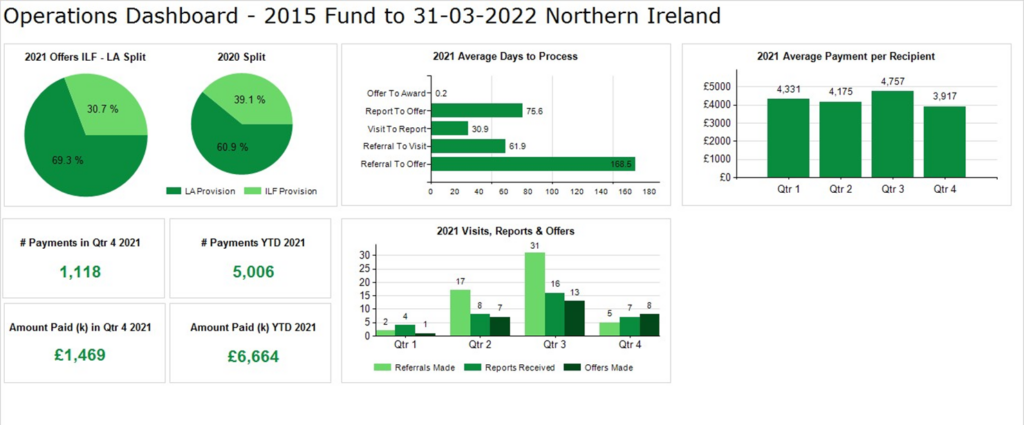
d. The following dashboard provides an overview of operational activity in relation to the Transition Fund:
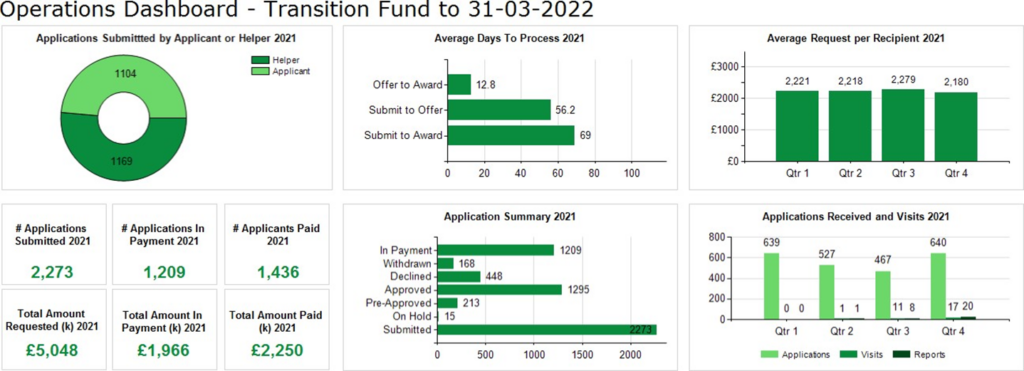
e. The following dashboard provides an overview of operational activity in relation to Complaints: To be added when technical issue corrected
The following table shows the key statistics for the period 1st January 2022 - 31st March 2022 and are aligned to standard annual financial reporting cycles as ILF Scotland is now in steady state operations. It does include Transition Fund which is articulated as Group 3.
